MercoPress. South Atlantic News Agency
Tag: Venezuela Elections
-
Friday, July 19th 2024 - 10:52 UTC
Maduro speaks of “bloodshed” if he is not reelected

Venezuelan President Nicolás Maduro foresaw a “bloodbath” in his country if he fails to be reelected on July 28. According to the most recent surveys, he would be trailing opposition candidate Edmundo González Urrutia by more than 10 percentage points.
-
Tuesday, July 16th 2024 - 08:22 UTC
Possible escalation of conflict between Venezuela and Guyana over Essequibo feared in Brazil
![A patriotic sign in Guyana advertises the region of Essequibo as the country's own [Nazima Raghubir/Al Jazeera]](https://en.mercopress.com/data/cache/noticias/100522/260x165/essequibo.jpg)
The delivery to Brazil of Israeli-built missiles has been linked to fears that the dispute between Venezuela and Guyana over the oil-rich Essequibo region might escalate in the wake of the fudgy July 28 elections. With the most prominent opposition politicians disenfranchised, Caracas might fuel an international conflict to cover up for the domestic unrest expected to unfold, it was hinted.
-
Saturday, June 22nd 2024 - 09:40 UTC
Maduro says “rightwing” opposition plans to cry foul at July 28 elections and launch a revolt
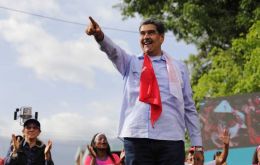
Venezuelan President Nicolás Maduro warned Friday that the “fascist rightwing” opposition would be crying “foul” after the upcoming July 28 elections and then promote a coup d'état “at any moment.” Maduro insisted he had proof that presidential candidates Edmundo González Urrutia and Enrique Márquez intended to follow that path to ignite “violence” after neither of them signed an agreement to recognize the outcome of the result of the elections earlier this week.
-
Wednesday, May 29th 2024 - 10:59 UTC
Venezuela withdraws invitation to EU as election observers

Venezuelan authorities announced Tuesday they were withdrawing the invitation previously extended to the European Union (RU) to monitor the July 28 elections in a move that cast additional doubts over a process that has for long looked fudgy following the disenfranchisement of opposition leader María Corina Machado.
-
Tuesday, May 28th 2024 - 08:02 UTC
Petro proposes “Political Peace” Agreement for Venezuela post-elections
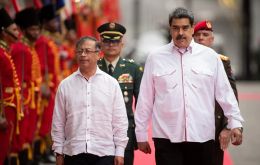
Colombian President Gustavo Petro has received a draft proposal aimed at establishing “political peace” in Venezuela following its upcoming presidential elections. This text, developed by Petro’s ambassador in Caracas alongside diplomats from other countries, and businesspeople is expected to be sent to Venezuelan President Nicolás Maduro for consideration soon.
-
Thursday, April 18th 2024 - 10:31 UTC
Petro suggests “life guarantees” for losers of Venezuela's elections

During a meeting in Bogotá with his Brazilian counterpart Luiz Inácio Lula da Silva, Colombian President Gustavo Petro Wednesday suggested that a so-called “life guarantee” be created in Venezuela for those losing the July 28 elections under world scrutiny over transparency concerns, Agencia Brasil reported.
-
Monday, April 15th 2024 - 23:59 UTC
Chilean FM says conditions not met for free elections in Venezuela

The Chilean Government of President Gabriel Boric Font is adopting a neutral stance regarding Venezuela's political crisis by keeping active ties with the administration of President Nicolás Maduro as well as with disenfranchised opposition leader María Corina Machado. However, “there are no conditions for free elections in Venezuela,” Santiago's Foreign Minister Alberto van Klaveren told reporters during the weekend.
-
Saturday, March 30th 2024 - 09:58 UTC
Unusual criticism from Lula da Silva and Petro on Venezuela's presidential race controversy
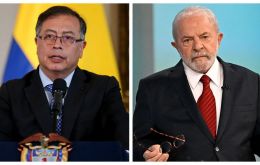
Renowned South American political figures Luiz Inácio Lula da Silva, President of Brazil, and Gustavo Petro, head of state of Colombia, have taken an unusual stance against Venezuela's government, criticizing its refusal to allow opposition candidate Corina Yoris to register for the upcoming presidential elections.
-
Wednesday, March 6th 2024 - 22:55 UTC
María Corina Machado hits back at Lula da Silva's criticism: “Me crying, President Lula?”
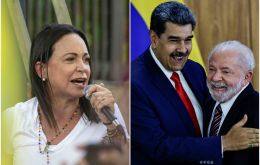
María Corina Machado, the opposition candidate elected in Venezuela's October primary elections, has responded strongly to Brazilian President Luiz Inácio Lula da Silva's recent comments indirectly criticizing her candidacy.
-
Tuesday, February 20th 2024 - 15:20 UTC
Uruguay's ambassador to Venezuela resigns
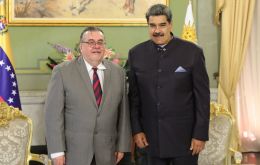
Uruguay's Ambassador to Venezuela Eber da Rosa announced Monday that he was resigning for personal reasons. His decision left the Multicolor Government of President Luis Lacalle Pou with the task of deciding which sort of diplomatic representation it plans to have in Caracas amid growing fears that elections will not be transparent following the disenfranchisement of opposition leader María Corina Machado.
